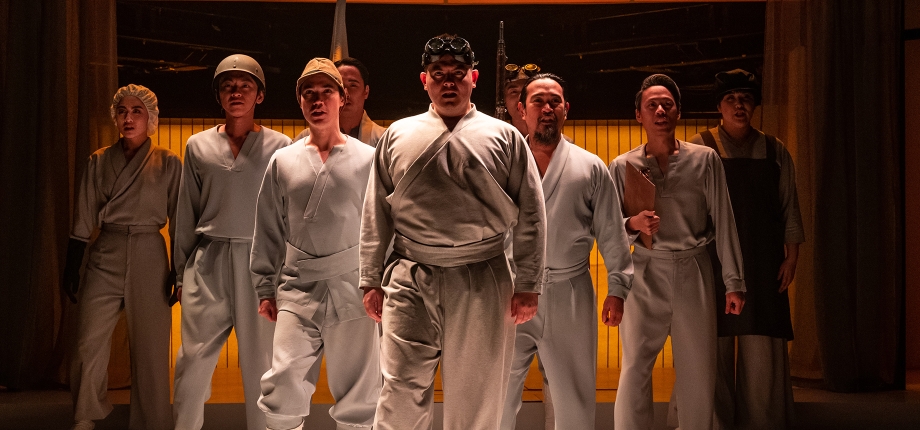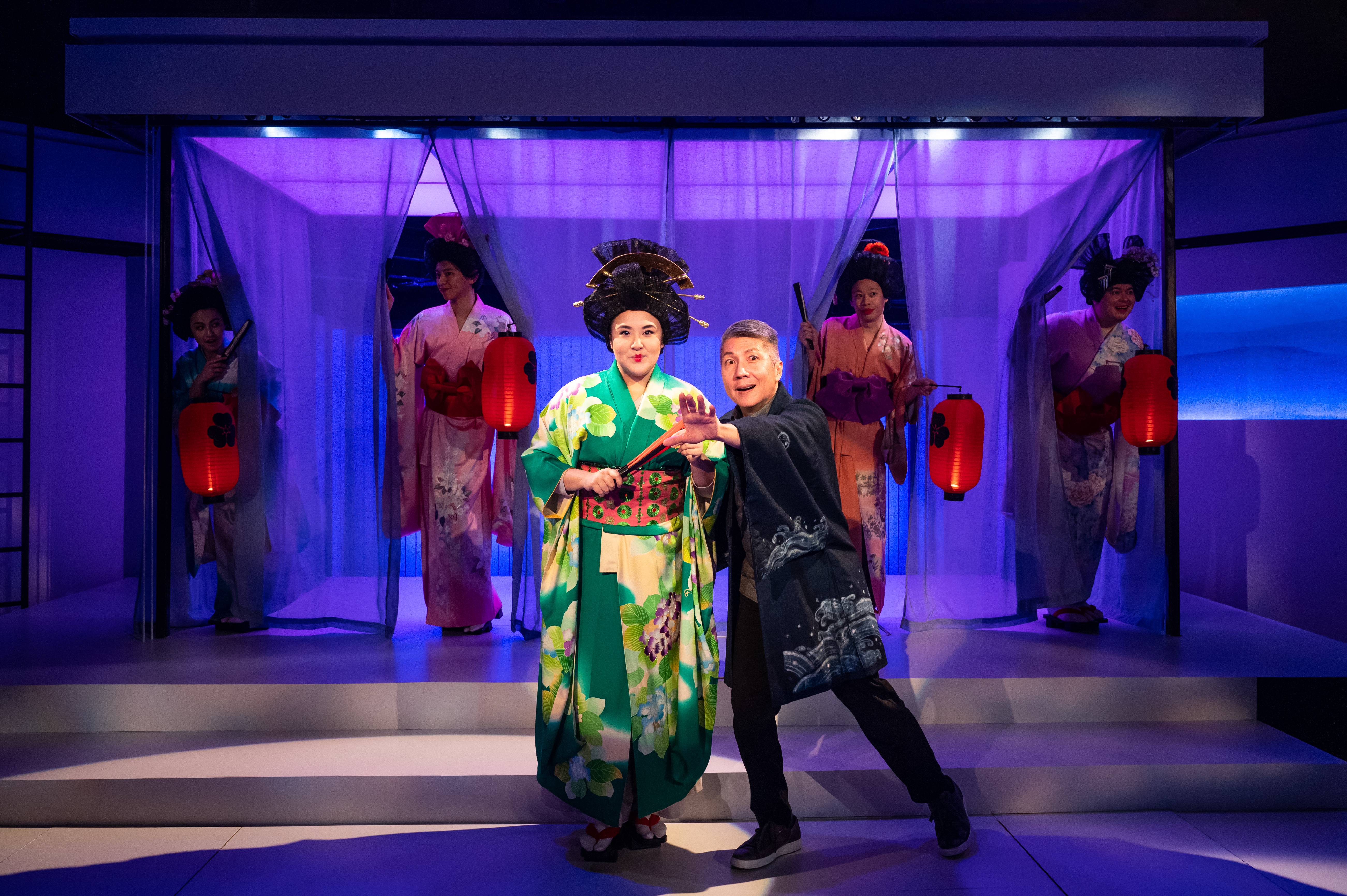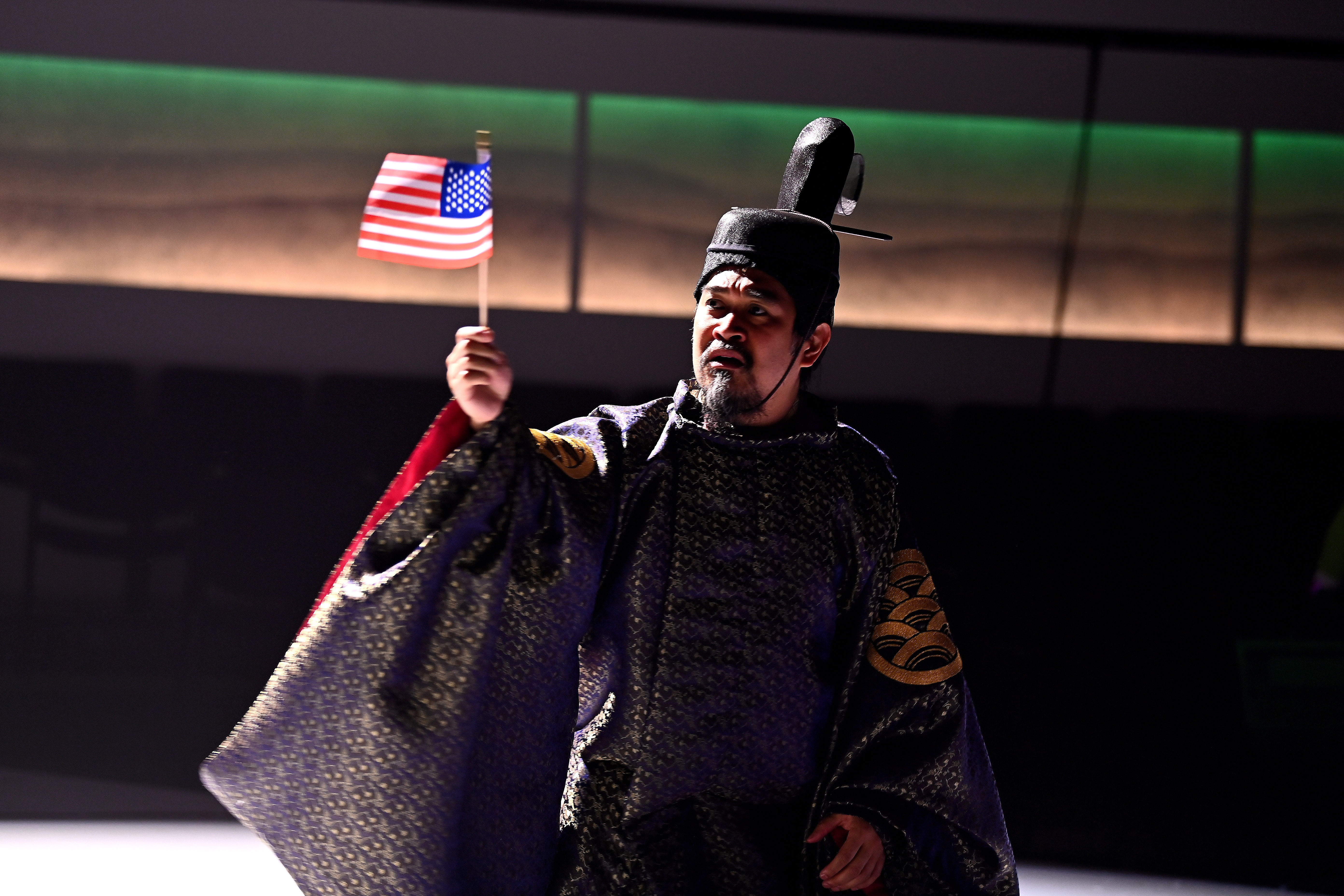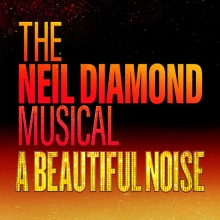A Look At The Floating Kingdom: Pacific Overtures with Signature Theatre

A Look At The Floating Kingdom: Pacific Overtures with Signature Theatre
“Nippon! The floating kingdom! An island empire which for centuries has lived in perfect peace, undisturbed by intruders from across the sea.” Here in the month of May 2023, we are looking at Pacific Overtures. One of Stephen Sondheim’s most intricate and complex musicals, Pacific Overture includes the number "Someone in a Tree", (reportedly among his favorites). We were given the opportunity to explore this musical in depth thanks to Signature Theatre’s stunning production earlier this spring.
A little history about Pacific Overtures and Signature Theatre:
Pacific Overtures
Written by John Weidman, with music and lyrics by Stephen Sondheim, and directed by Broadway legend Hal Prince, Pacific Overtures made its Broadway debuted in 1976 at the Winter Garden Theatre. The show traces Japan’s first contact with America through the modern age and the westernization of the nation. The themes touch on colonization, culture, and remaining true to heritage.
Signature Theatre
Founded in 1989, Signature Theatre is a Tony Award®-winning regional theater that is renowned for its inventive productions, thought-provoking pieces, and their reinventive takes on Sondheim shows. Their 1991 production of Sweeney Todd brought them into the foreground of regional theatre and was acclaimed by critics and audiences alike. Since then, Signature Theatre’s productions have reached audiences in and outside the region of Washington, DC, putting on at least one Sondheim show every year. The company has received over 100 Helen Hayes Awards and in 2009, received a Regional Theatre Tony Award.
We sat down with some of their Pacific Overtures cast and creative team and learned from their insights.
What drew you to Pacific Overtures?
Ethan Heard (Director): First of all, I love Sondheim, and I love the ambition and experimental nature of this show. Also, my mom is Chinese, and my dad is white, so I’ve always been interested in the idea of “East meets West.” As a director, I was very excited by the opportunity to honor and explore traditional Japanese forms like kabuki, bunraku, taiko, and samurai sword fighting.
Angie Benson (Associate Music Director & Odaiko Player): Ethan Heard and his vision for the show drew me in hook, line and sinker. I had never worked on a production team of an AAPI/API majority, nor had I been involved in a show with 100% AAPI/API cast members. Ethan's commitment to the importance of this really resonated with me, and it was an honor to serve on his team. Having the opportunity to share one of Sondheim's least produced pieces was also an exciting draw.
Jason Ma (Reciter): What drew me to this particular production was hearing the concepts and ideas of our director, Ethan Heard, what he believed a production of this piece should and could be for this particular moment in our present world. I was particularly drawn to his prioritizing and highlighting the humanity and the interior lives of the Japanese characters in the stories contained within this piece, which ended up creating a strong empathetic and emotional connection with our audiences. This was a Pacific Overtures for the heart.
Daniel May (Kayama): Stephen Sondheim’s genius. A musical written for AAPI bodies and faces (there are so few). I’ve always felt drawn to Kayama as a character. I related to his energy, his conflict, his reservedness. I wanted to explore that part of him and myself as well.
Jonny Lee Jr. (Manjiro): Being an Asian American actor, Pacific Overtures has always been on my radar due to its rare portrayal of a completely Asian cast. It's also one of the only successful musicals produced regionally that delves into Japanese culture, and notably, it's Sondheim's only show about an Asian culture. As Pacific Overtures is rarely produced, my opportunities with it have always been limited. Thus, when I learned about Signature Theatre's upcoming production, I felt compelled to audition.

Chani Wereley (Madam) and Jason Ma (Reciter) with Quynh-My Luu, Albert Hsueh, Andrew Cristi, and Christopher Mueller in Pacific Overtures at Signature Theatre. Photo by Daniel Rader
Many regard Pacific Overtures as Sondheim’s most complex and ambitious score. What was the experience like working with this musical masterpiece?
Ethan Heard: I love that the musical material is quite evenly distributed among the ensemble. We did the show with ten actors; everyone got juicy, challenging music to sing, and everyone was featured as a soloist. Alexander Tom, our music director, and I looked at several versions of the score (Original Bway 1976, Roundabout 2004, Classic Stage 2017) to piece together our own new version of “Next.” We also worked with Mark H. Rooney, our Taiko consultant, to devise drumming for the fight sequences, lion dance, atomic bomb, and other moments.
Angie Benson: It was a dream! With the blessing of book writer John Weidman, our music director Alexander Tom and Ethan did a phenomenal job of creating our updated version, which combined elements from the original 1976 Broadway production, 2004 Roundabout revival, and 2017 Classic Stage Company production. Ethan's vision also included the use of a 6'6" tall Japanese Odaiko drum, which I had the honor of playing. The drum was one of the two largest known on the East coast. Our incredible Taiko consultant, Mark H. Rooney, created all of the drum sequences and served as my coach. Playing Sondheim's score was already so exciting, but the Odaiko factor really added to the thrill of the experience! I miss it every day.
Jason Ma: This score is notoriously difficult to learn, but once it’s in your body and your voice, it becomes a transcendental experience, as you live inside of Sondheim’s music and lyrics. And because it is so tricky and difficult, one can never fully relax or just rely on motor memory. You stay completely present, concentrated in the moment, and what’s so interesting is that the audience senses this precariousness, and in some way, they begin to share the burden. You can feel them rooting for us, holding their breaths, marveling at the virtuosity required, and of course, forgiving you when the inevitable happens and you fall off the tightrope and have to find your way back. This score raises the already high stakes of live theater and live performance to the nth degree.
Daniel May: A dream. A real challenge. The way this orchestration relates to the vocal lines was unlike anything I’ve worked on. And very different than how supported by the score I felt when playing Jack in Into the Woods. This score is subtle and efficient in a way that exposed us with cleverness and delicacy. And the lyrics and opinions of these songs are so specific but more observant. It was an exciting space to get to play.
Jonny Lee Jr.: I agree that Sondheim's score in Pacific Overtures is among his more intricate and challenging works. Personally, I found learning the music to be tough, though not impossible. The most significant challenge was training my ear to align with a more Japanese musicality, especially in “Poems” where the accompaniment doesn't provide much assistance in locating the melody's notes. Repetition, practice, and self-assurance were crucial in mastering the songs.
Pacific Overtures engages with the subjects of imperialism, colonialism, Orientalism, and national and cultural identity. How did you navigate through these topics in the creative and rehearsal process?
EH: I asked Leslie Ishii, Artistic Director of Perseverance Theater and ArtEquity facilitator, to lead us in a workshop and conversation about these challenging topics. The cast really appreciated the opportunity to reflect on thorny questions like: “Am I Asian enough to do this show?” “As a diverse group of Asian Americans, how do we honor Japan and our own sometimes-fraught personal histories with Japan?” “What does it mean to be doing a show from ‘the Japanese perspective’ that’s written by white American men?” Throughout rehearsals, I tried to create space and time for us to pause and continue these conversations.
JM: Ethan, our Asian American director, worked with intentionality to acknowledge, to address, and to slay the “ism” dragons, as well as tackle the tricky pitfalls in this beautiful and ambitious piece, written almost 50 years ago. I think that he was quite successful in creating a production that is in conversation with the present, giving the cast, the creative team, and our audiences a new, contemporary lens with which to look at this material. I’ll note that the major commonality in our rehearsal room, that informed all of our conversations and approaches during our creative process, was our shared identity as Asian Americans - the director, the cast, and the music team. We share the experience of being perpetual foreigners in this country of our birth, along with the narratives in our media and entertainment that reinforce our “otherness” and flatten out our humanity into stereotypes and tropes. Ethan created a room and creative space where we could excavate the positive cultural intent and intrinsic humanity in the story, fleshing out, in a new way, the characters of the 19th century Japan imagined by Sondheim and Weidman. Finding our way into this world through a contemporary Asian American lens was some of the most satisfying character work I’ve ever had the pleasure of doing.
DM: I tried to learn as much about the history as I could. I asked myself in what ways I identify and engage with these themes personally. I really leaned on our incredible Japanese consultants and designers who offered invaluable insight on their personal experience in these areas as well.
JLJ: On our second day of rehearsal, we had an exceptional DEI workshop led by Leslie Ishii. It facilitated a comfortable environment where we could openly discuss sensitive topics and our perspectives. It was inspiring to realize how much we had in common, despite originating from distinct Asian cultures and American upbringings. As AAPI artists, we are a part of a vast group originating from various ethnicities and cultures, each with distinct political histories marked by tension and mistrust oftentimes due to colonialism and imperialism. With that in mind, theatre provides a unique space for Asian Americans artists to collaborate on a shared goal and learn from each other's experiences. Many of us have family histories directly impacted by the aftermath of the events depicted in Pacific Overtures, some more tragic than others. By participating in this production, we gained a better understanding of Japan's transformation into an imperialistic aggressor in the East and how to navigate that story and tell it with respect.

Eymard Meneses Cabling (Lord Abe) in Pacific Overtures at Signature Theatre. Photo by Shannon Finney
What message and lessons does Pacific Overtures have for today’s artists and audiences?
EH: Pacific Overtures reminds me that one show can successfully contain a variety of tones and styles. Juxtaposition and bold contrast can be exciting. Shows with fabulous opportunities for Asian American performers are still relatively rare, and we need more of them!
JM: So many lessons and some very deep messages throughout, but I’ll discuss “Next.” As the closing number of this show, it has managed to remain completely up-to-date and dramaturgically useful from 1976 to the present. The structure, with its spoken word statistics in the last section, allows every production to update the endpoint of the song’s dramatic journey with present-day factoids and numbers regarding Japan. In 1976 this closing number was about a Japan that was on the precipice of world economic domination, and the repeated “Next” in the lyrics felt like a checklist of ascendant steps on the way to surpassing the US as a global superpower; and yet, without changing a single lyric or note of the score, in our 2023 production the repeated “Next” feels like a question about what the future holds for a country with an aging workforce, a stagnant economy, and natural resources depleted and devastated by industrialization. I’m in awe of the writing of book/music/lyrics that creates a closing number that’s this all-encompassing, yet somehow specific, that still sounds so fresh and contemporary almost 50 years after it was written, and has built-in space for visual storytelling that allows the director to create their own message and lessons for the audience.
DM: I think Pacific Overtures is a story about power and deciding what you believe and what you’re willing to do against the backdrop of politics and powers outside our control. The message may be to examine those things for each of us.
JLJ: Pacific Overtures provides an insightful academic portrayal of the end of the Japanese Shogunate due to Western imperialism, from the Japanese perspective. It critiques America's actions in coercing Japan into opening its ports to trade. Ultimately, the show prompts audiences to question whether these events were beneficial to Japan or not. From an artistic standpoint, Pacific Overtures is a unique and experimental work of American musical theatre. It stands apart from other productions in the musical theatre canon, featuring innovative artistry and unconventional storytelling techniques not commonly seen in American theatre. I personally feel that the show exemplifies the vast range of possibilities within the musical theatre art form.
What about Pacific Overtures resonated with you personally? Is there a lyric that has stayed with you?
EH: The lyric that stays with me is “sift the ashes.” At the end of our production, the Reciter lifts up a handful of ash as modern Japanese folks swirl around him. For me, it’s an image of destruction and rebirth. After forest fires, after Capitalism, what might be possible?
AB: Working on Pacific Overtures was a surprisingly emotional experience for me, one that I'm honestly still unpacking. Being in a room filled with a majority of humans who not only look like me, but have also experienced feelings (around race) that I didn't even realize I've felt was profound. The feeling of community/family and what we created together and shared with our audiences is what has really stuck with me. It was one of the most special experiences I've had in my career thus far, and one that will always hold a special place in my heart.
JM: I’d been experiencing “Someone in a Tree” in a very personal and emotional way all through this run, and often fought to keep my own feelings from overwhelming me onstage. I’m proud to say that a tear never fell, that I was able to keep it down to a tasteful welling-up, resulting in a “character appropriate” glisten in the eye. I think that our staging of this number, where the Reciter physically enters into the world of the song, walking around, talking with, and sitting next to the old man, the boy, and the samurai in close proximity, kept me very much engaged with the lyrics, and in the aftermath of our great loss of Sondheim from this realm, allowed me the privilege of spending a substantial amount of time inside of his work.
It's the fragment, not the day.
It's the pebble, not the stream.
It's the ripple, not the sea
That is happening.
Not the building but the beam,
Not the garden but the stone,
Only cups of tea
And history
And someone in a tree.
For me this is Sondheim describing himself in the act of artistic creation. I think every writer, myself included, can go into a zone where you’ve entered into the imaginary world of your piece and you’re just eavesdropping on your characters, like the boy in the tree. Sondheim has been the master at excavating the smallest of details that can build complex, fully realized worlds of fascinating people for us to visit. He is the gold standard for teasing out and identifying the little human behaviors and quirks that bring his characters to magnificent life, that humanize his stories. An avid explorer of the specificities of the heart and observer of the soul, he is someone who spent a lot of time in a tree.
DM: That our character is created by the decisions we make in life. We have an amazing capacity for anything. And that the decisions made by the great powers of the world will continue to ripple through all of us for generations to come. The small is a part of a greater whole and we are all connected.
The swallow flying through the sky is not as swift as I am flying through my life. (“A Bowler Hat”)
JLJ: The lyric that resonates with me the most is from “Someone In a Tree.” "It's the fragment, not the day. It's the pebble, not the stream. It's the ripple, not the sea, that is happening." These words are not only beautiful to hear, but they also express a fundamental truth that we often forget in our fast-paced modern lives. The most significant moments in life can often be the smallest and most overlooked ones. Something as simple as a tree falling in the woods can have a significant impact, even if no one sees or hears it.
For me, these lyrics serve as a reminder to cherish the small moments in life, whether it be a brief conversation with a cashier or an intimate dialogue with a friend at a coffee shop. Even reflecting back on our production of Pacific Overtures reinforces this idea. Although it was only three months, our production has left me with invaluable life lessons and connections that I will cherish for a lifetime.
It was a privilege to talk to Signature Theatre about such a significant piece of musical theatre during AAPI Heritage Month. Bravo to Signature for putting on such an incredible production. We here at Music Theatre International cannot wait to see what Signature Theatre (and each of these incredible artists) do next!
Learn more about Pacific Overtures.

























